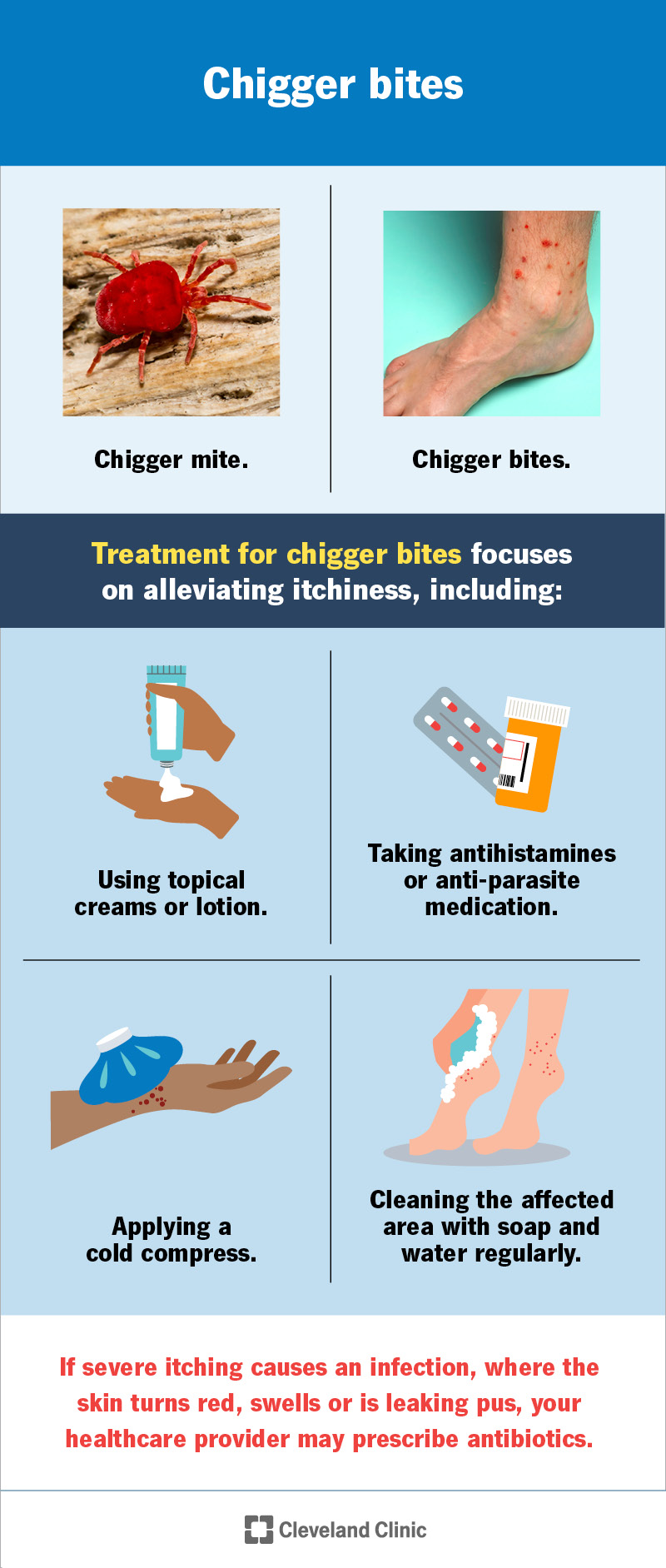Chiggers are tiny mites that live outdoors in grassy or wooded areas near water. They thrive in warm temperatures, especially during the summer months and attach to your clothes and bite your skin. Chigger bites cause itching at the site of the bite, commonly near the seams of tight-fitting clothing.
Advertisement
Cleveland Clinic is a non-profit academic medical center. Advertising on our site helps support our mission. We do not endorse non-Cleveland Clinic products or services. Policy
Chiggers (trombiculidae) are a species of mite, and are a close relative to spiders and ticks. Chiggers are microscopic and are almost invisible to the naked eye. Once chiggers hatch from eggs (larva), the mites feed on the skin tissue of a host (human or animal) before falling off and turning into an adult mite. Found around the world, chiggers live outdoors on plants in wooded or grassy areas, typically around water. They are most active during the summer months when temperatures are hot.
Advertisement
Cleveland Clinic is a non-profit academic medical center. Advertising on our site helps support our mission. We do not endorse non-Cleveland Clinic products or services. Policy
Chigger larva will attach to your clothing and move to your skin to feed. The chigger larva will release a liquid chemical into your skin to kill skin cells (digestive enzyme). The dead skin cells form a tiny straw (stylostome) for the chigger to drink your skin tissue. The chigger’s chemical causes itching that is very intense for the first 24-48 hours before slowly going away over the next two weeks. Chiggers will fall off of your skin if you begin to scratch.
Chigger bites can affect anyone who might pick chiggers up on their clothing outdoors in grassy, wet or wooded areas.
Chiggers live in grass or wooded areas and attach to your clothing. Their favorite sites to feed are areas where your skin and clothing have close contact, especially at waistbands, bra lines and sock lines, or where your skin folds. Common areas where chiggers bite include:
Chigger bites are very common in the summer months when temperatures are warm to hot. Many people don’t report chigger bites, so the actual number of cases is unknown.
You probably won't notice chigger bites right away. It could take up to three hours after the mite makes contact with your skin before you experience any symptoms. Chigger bites cause itching near the bite zone.
Advertisement
Symptoms of chigger bites include:
You can get a chigger bite if you walk through an area where chiggers live, including:
Chiggers will attach to your clothing and move onto your skin, where they bite.
Your provider will diagnose chigger bites after a visual examination based on the pattern of the bite (in a line) and the location (where tight-fitting clothing rests). If you recall where you were when the bites occurred, specifically outdoors in grassy, wet or wooded areas, it will help diagnose this condition.

Image content: This image is available to view online.
View image online (https://my.clevelandclinic.org/-/scassets/images/org/health/articles/chigger-bites.jpg)
Because chiggers don't burrow into your skin and the rash usually starts after the mites have already detached from the skin, treatment specifically to remove the mites isn't needed. Instead, treatment for chigger bites focuses on alleviating itchiness, including:
If severe itching causes an infection, where the skin turns red, swells or leaks pus, your healthcare provider may prescribe antibiotics.
The itchiness is most intense during the first 24-48 hours after the bite. Symptoms will slowly go away and stop after two weeks.
Chigger bites can be treated at home by using an over-the-counter anti-itch cream like calamine lotion and/or taking antihistamines to reduce itching. Chiggers don't burrow into your skin, so there is no need for any other at-home remedies.
You will feel relief immediately through the use of anti-itch creams or antihistamines, but the symptoms can last for up to two weeks, lessening in severity over time.
You can expect to have itchy skin at the site of the bite, which you will find where clothing is tightly fit on your skin, especially at sock lines and waistbands on pants. Chigger bites usually resolve on their own within a few days but can last up to two weeks.
You can prevent chigger bites by:
Advertisement
After a bite, be sure to treat the affected area with an anti-itch cream or lotion to prevent itching. You might want to trim your fingernails to avoid skin tears and further irritation if you feel the need to scratch. You should wash your clothing in hot water or treat it with pyrethroid insecticides.
You should seek care from your healthcare provider if:
Chiggers are also called “red bugs” and share some similarities to spiders (arachnids). Identifying factors of a chigger include:
Chiggers, bed bugs, fleas and mosquitos are all different types of bugs that can bite and irritate your skin.
Advertisement
Often, preventing chigger bites is easier said than done. These microscopic bugs attach to your clothing and cause itching that might damper your outdoor activities. Thankfully, chiggers easily fall off of your skin at the first sign of an itch, and the symptoms decrease in severity after the first 24 to 48 hours. Treat the bite with an anti-itch cream to alleviate any discomfort.
Advertisement

Sign up for our Health Essentials emails for expert guidance on nutrition, fitness, sleep, skin care and more.
Learn more about the Health Library and our editorial process.
Cleveland Clinic’s health articles are based on evidence-backed information and review by medical professionals to ensure accuracy, reliability and up-to-date clinical standards.
Cleveland Clinic’s health articles are based on evidence-backed information and review by medical professionals to ensure accuracy, reliability and up-to-date clinical standards.
Need care fast? Cleveland Clinic’s Express Care and Urgent Care locations treat everything from sprains to sinus infections — no appointment needed.
